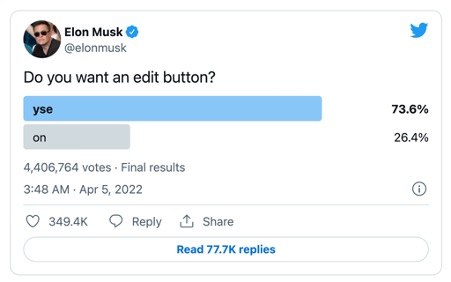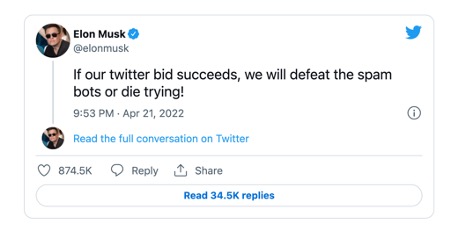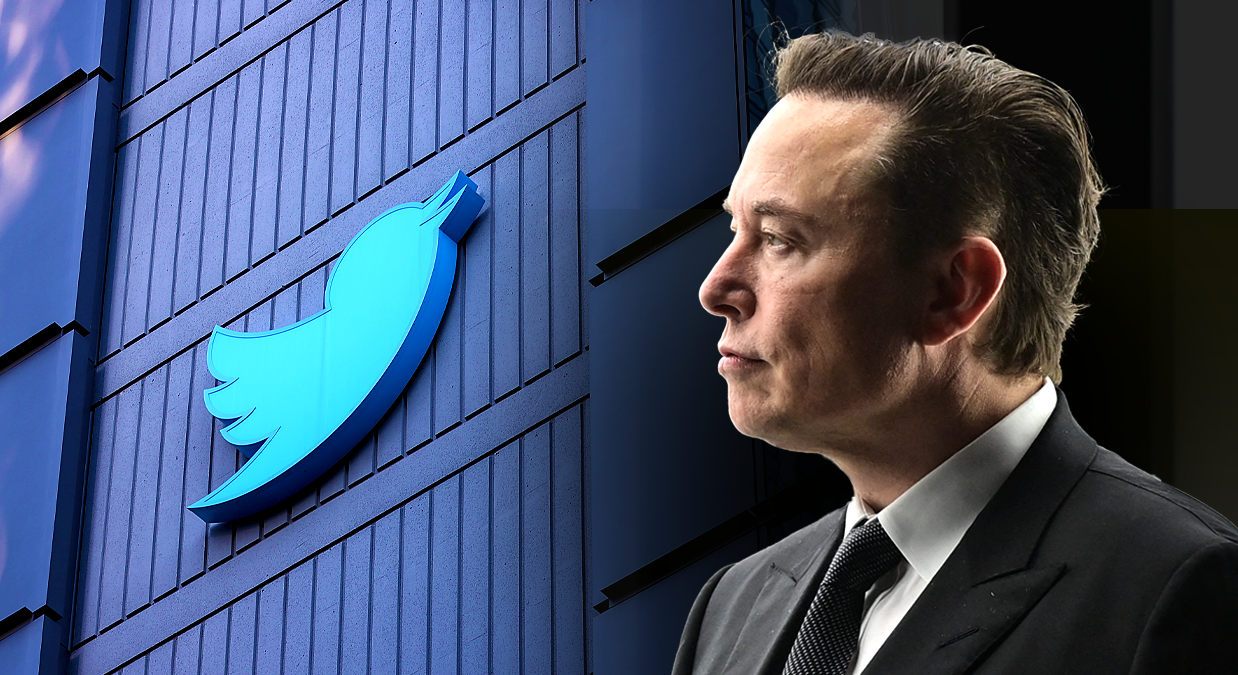After weeks of suspense, Twitter’s board reportedly struck a deal to sell the company to Elon Musk for $44 billion.
The sale will transfer all of Twitter’s shares to Musk, turning it back into a private-owned business.
Musk promises to unlock Twitter’s “tremendous potential” once the deal is complete, with emphasis on improving free speech.
Some celebrate his commitment to free speech, whilst others fear it could enable racism and bullying on the platform. So which will it be?
In a press release announcing the acquisition, Elon Musk shared a glimpse of the future of Twitter, which he described as “the digital town square where matters vital to the future of humanity are debated”.
He explained that he will improve Twitter by “enhancing the product with new features, making the algorithms open source to increase trust, defeating the spambots, and authenticating all humans”.
Whilst this statement offers little detail, Musk has previously discussed each of these issues in more detail. Let’s take a deeper look at each of his proposed changes.
Enhancing the product with new features
This is perhaps the vaguest entry in the list of changes promised by Twitter’s potential new owner. Musk hasn’t promised or shared what those new features will be, and it comes as no surprise that a tech product will see new features added all the time.

One change we expect to see is the introduction of an edit button, which is Twitter’s most requested feature of all time.
Twitter has, up until now, avoided releasing an edit button due to complications of implementing it, where it’s feared that someone would edit their tweet after it’s been retweeted to have new content instead.
This could be used for anything from light trolling to spreading abusive content once a tweet has gained popularity.
Making the algorithm open source to increase trust
Twitter’s feed is now algorithmically sorted by default, which means that you don’t see the latest tweets first, but rather, the tweets the algorithm thinks are most relevant to you.
As with most social media curation algorithms, people have requested more details about how it works to ensure it’s fair.
Musk seems to be willing to make the algorithm’s decision-making public so that he’d increase customers’ trust in Twitter.
While this may seem reasonable, it would undoubtedly have some inevitable consequences. Particularly, bad actors will be able to game the algorithm in their favour once the data is publicly available.
Defeating the spam bots
Musk is no stranger to Twitter’s spambots, mainly ones involving cryptocurrency.
It was previously reported that Twitter banned any new accounts named “Elon Musk” to tackle an influx of spam accounts impersonating Tesla’s founder, who was a prominent advocate for several cryptocurrencies, including dogecoin.

It’s unclear how Musk will singlehandedly defeat spambots after years of efforts from highly qualified teams working on this issue.
Read more: Will robots take over humanity?
Authenticating all humans
Finally, on the initial list of Musk’s plans is to authenticate all humans.
GQ Magazine suggests that this will be optional verification, allowing any real human to receive a verification badge on Twitter.
This will look different to the blue checkmark currently used to highlight public figures and celebrities but should still allow real humans to be different from spam accounts.
The hope is that authenticated users may have healthier debates online and avoid abuse.
‘A world of pain’
Whilst the goals above are noble, some experts have expressed doubts about Musk’s ability to implement these changes successfully.
Ex-Reddit CEO Yishan Wong tweeted that the Tesla founder will be “in for a world of pain” if he buys Twitter. He shared how his experience running Reddit proved to him that finding the right balance for free speech online is complex and is easier said than done.
Others have pointed out that Elon Musk has repeatedly bullied his critics on Twitter, with a recent tweet mocking Bill Gates’ body.
Regardless of Musk’s tweets, many argue that it’s dangerous to let one very powerful man make up all the rules for the “digital town square”.
Why is Elon Musk even buying Twitter?
Many have also wondered why Elon Musk, who runs Tesla, SpaceX, Neuralink, and more, would further split his focus.
Aren’t renewable energy, rocket science and brain implants enough to keep him busy? Why would the richest man on earth take another massive challenge, redefining online free speech, when he’s already got enough on his plate?
This wouldn’t be the first time a tech multi-billionaire decided to own a slice of the online media world.
In 2013, Amazon CEO Jeff Bezos bought the Washington Post for $250 million. This is a fraction of the $44 billion that Elon Musk has agreed to pay for Twitter.
It’s not clear why Musk is willing to pay such a large sum of money to aggressively buy a social network or how much time he’ll dedicate to running it.
Twitter founder and ex-CEO Jack Dorsey expressed support for Elon Musk, calling him the “singular solution” for solving the company’s issues. He also said that he regrets that Twitter is a company, describing it as “the closest thing we have to a global consciousness”.
Musk’s impact on Twitter is yet to be seen, though he’s known for suddenly making radical announcements (such as how he announced he’s buying Twitter). Calls to leave Twitter were trending in the past couple of weeks, with public figures such as Jameela Jamil announcing their departure.
Musk said that he hopes his “worst critics remain on Twitter, because that is what free speech means”.
Donald Trump has announced that he won’t be rejoining Twitter, and will instead post on his own social network, TRUTH.







